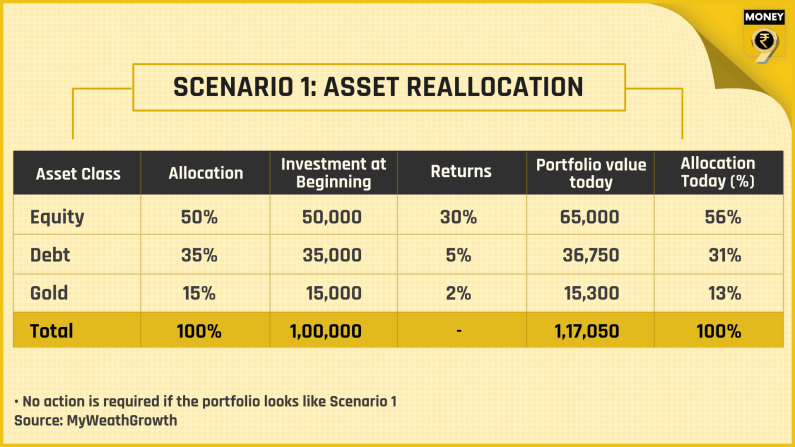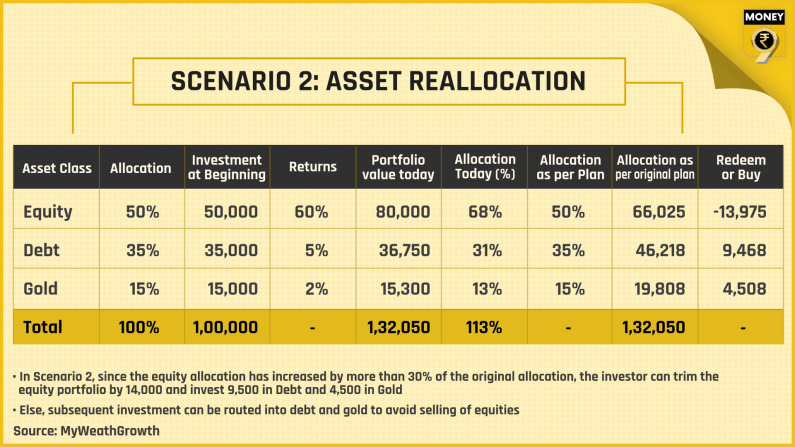Reallocate your portfolio to combat capital erosion
Asset reallocation is important because every asset class goes through different phases and has a different risk-return profile
- Teena Jain Kaushal
- Last Updated : August 18, 2021, 15:28 IST

Asset allocation is important because every asset class goes through different phases and has a different risk-return profile. Therefore, diversification across assets is required to optimise one’s returns. It is essential to invest in the right kind of asset class as it will decide the kind of return you will be getting. But due to market volatility at times the asset allocation changes, exposing you to the risk of capital erosion as one approaches the milestone. Hence, it is essential to reallocate funds by gradually switching among investments such as equity, gold and debt funds.
“Maintaining asset allocation throughout market cycles is an important part of investing. You should rebalance your allocation in equity or any other asset class if it has substantially become overweight or underweight at present. Else, you should continue to remain invested with the existing allocation even though the stock market is at an all-time high or interest rates are low or gold prices have dropped,” said Harshad Chetanwala Co-founder MyWeathGrowth.
How to reallocate your portfolio?
The solution lies in reallocating the investments so that your portfolio does not remain overexposed to one asset class. For example, we have shown how rebalancing needs to be done with the help of an example assuming one invested Rs 1 lakh last year in equities, gold and short term debt funds in the ratio of 50% 15% and 35%, respectively.

“To rebalance the portfolio, you can reduce the allocation from the asset class which has become overweight and reinvest the same money in other asset classes. At present, there is a possibility that equity allocation in the portfolio would have increased as the stock market has surged. You can rebalance by exiting some of the funds or stocks that are not performing well compared to your other holdings. The small caps have surged a lot in the last year, you can also look at trimming your holdings in these companies or funds first if you have it in your portfolio,” said Chetanwala.

“Many investors invest every month in equity funds or shares of different companies. They can follow another strategy where their upcoming monthly investment towards equities can be reduced, and the same money can be invested in other asset classes if required. This will help them to continue to hold their long term investment in equities as they do not have to sell or redeem it, at the same time, the allocation in other asset classes can increase with future monthly investment. Again, rebalancing should be only taken up if the allocation in equity or any other asset class has substantially become overweight or underweight in your portfolio,” said Chetanwala.
How much should one allocate?
The allocation between debt and equity will vary from person to person depending on the risk appetite. Generally, it is perceived that the older the person, the lesser risk one can take There is a thumb rule that is generally used -“100 – your age” to decide the equity exposure that one should have.
Download Money9 App for the latest updates on Personal Finance.
Related
- Budget’24: New LTCG rule to hit long-term property owners hard
- Looking to buy gold? Buy now before it’s too late!
- Budget 2024: What is NPS ‘Vatsalya’ scheme? How to apply & other benefits?
- Budget’ 24: Startup ecosystem all smiles with scrapping of angel tax
- Budget’24: New NPS scheme for minors launched, here’s how you can benefit
- Budget’24: Gold, silver prices to soften soon, customs duty drops to 6%

